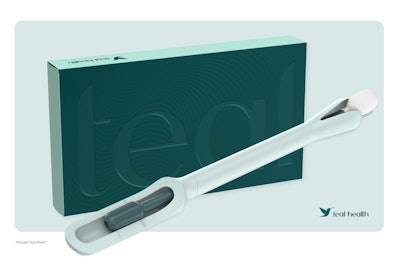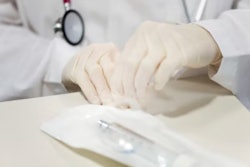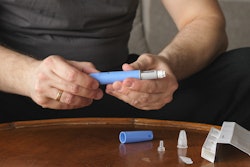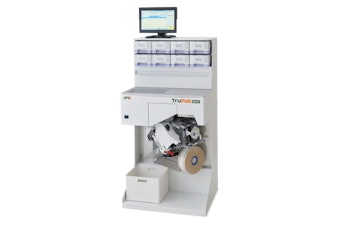
Self-collection at home
San Franciso-based Teal Health received breakthrough designation to accelerate review of its at-home cervical cancer screening device.
“The Teal Wand is a proprietary device designed to enable people to easily, comfortably, and confidently collect their own vaginal sample for cervical cancer screening from their home or health clinic, without the need for an invasive exam,” the company reports. It is ergonomically designed for a range of bodies and health literacy levels.
Initial testing in a 215-person study showed success in sample collection:
- 97% of women said it was easy or very easy to use
- 94% said they would choose self-collection over the current standard of care with a clinician collecting
- 87% said they would be more likely to get screened if the Teal Wand were an option
Users collect their sample at home and then mail it to a laboratory for testing on an FDA-approved diagnostic test for primary screening of high-risk HPV (human papillomavirus). Teal Health provides a patient portal for users to view test results, access health providers, and (when appropriate) receive assistance in securing follow-up care or procedures.
The initial study was followed by kickoff of “SELF-CERV,” a 600-participant nationwide clinical trial to validate the performance of the Teal Wand and compare results against a clinician collected sample with a speculum and brush.
The study completed enrollment last month, months ahead of schedule. Participants represent people of different races/ethnicities, socioeconomic status, and sexual and gender orientation.
Self-collection in the clinic
The FDA has approved expansions to the indications for use (IFU) for the Beckon, Dickinson (BD) Onclarity HPV Assay and the Roche Molecular Systems cobas HPV Test.
These tests were previously approved to screen for potentially lethal cervical cancer by detecting Human Papillomavirus (HPV) in samples collected by a clinician in a healthcare setting.
The new guidelines now allow patients to self-collect a vaginal swab in a healthcare setting if they and their healthcare provider decide that a clinician cannot collect a cervical sample. This expansion aims to provide more cervical cancer screening options, especially for those who do not participate in routine screening.





















